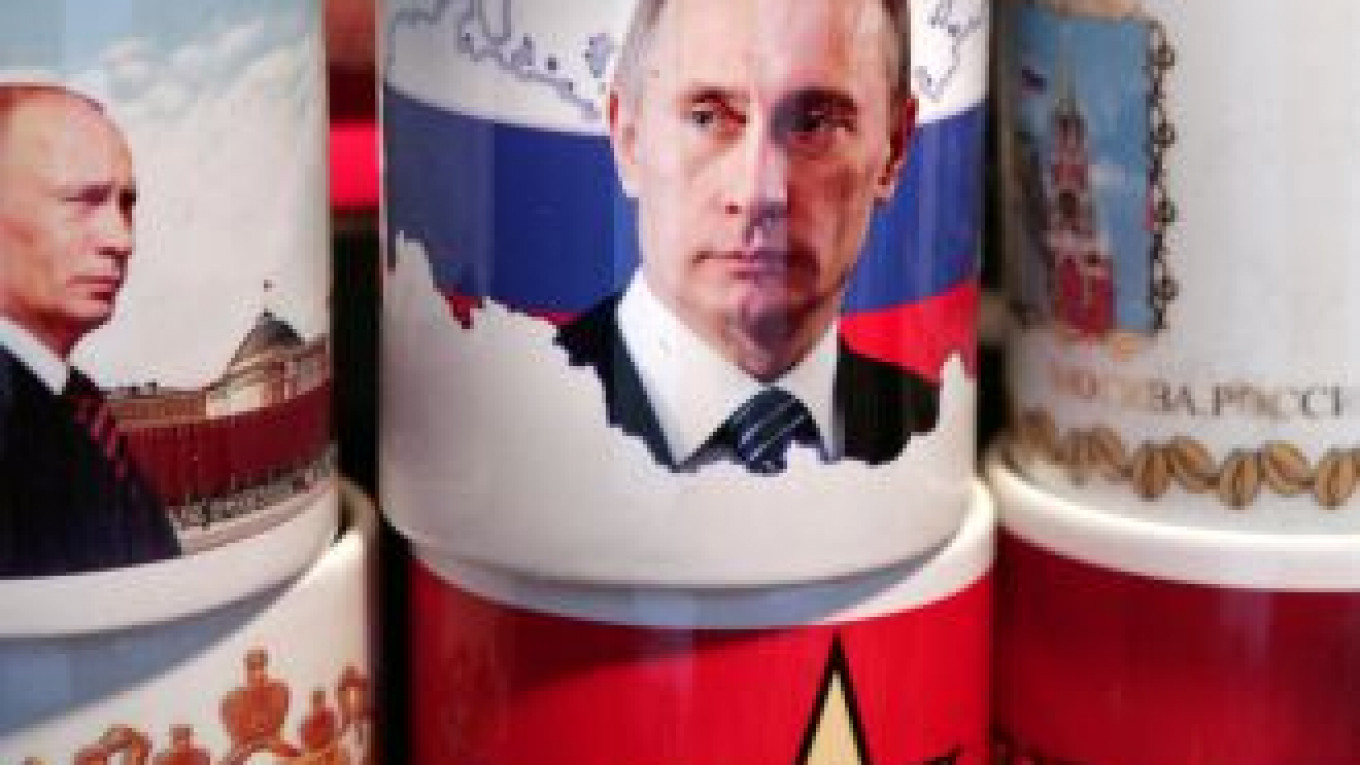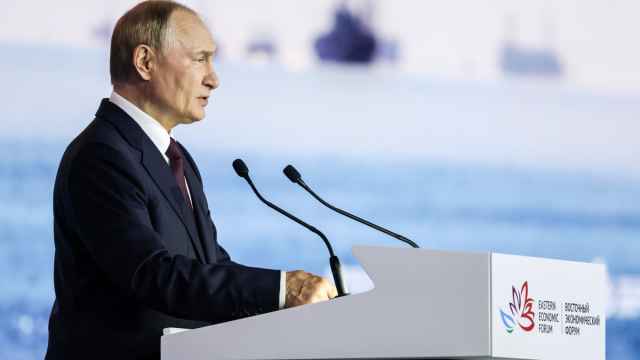During an address to foreign investors in fall 2009, Central Bank First Deputy Chairman Alexei Ulyukayev announced that the state was ready to reduce its ownership of Sberbank to 50 percent plus one share.
Two years later, in August 2011, Sberbank president German Gref told reporters that the sale was just around the corner.
Fast-forward eight months, past another hint of a share sale, and Deputy Prime Minister Igor Shuvalov announced in April that the window for the sell-off of 7.6 percent in Sberbank could open in the late summer or fall.
Energy
Rosneft
Zarubezhneft
Infrastructure
Aeroflot
Federal Grid Company
InterRAO
RusHydro
Russian Railways (25% by 2013)
Sheremetyevo International Airport
Sovcomflot (50% minus one share by 2013)
Transneft
United Aircraft Building Corporation
United Shipbuilding Corporation
Uralvagonzavod
Telecoms & Technology
Rostelecom
Rusnano (10% by 2013)
Svyazinvest
Mining
Alrosa
Banking
Rosselkhozbank
Sberbank (7.58% by 2013)
VTB (25% by 2013)
Agriculture
Rosagroleasing (49.9% by 2013)
United Grain Company (100% by 2013)
Source: Vedomosti
But Central Bank chief Sergei Ignatyev was less committal. He told the State Duma several weeks later that a stake sale had not been "ruled out" for 2012.
Sberbank is the crown jewel of Russia's much-touted privatization program, which extends to hundreds of companies in all major sectors of the economy. It is the first of the big state-owned national icons scheduled to be put on the market.
Gref has maintained that unfavorable market conditions have repeatedly delayed the attempt to peddle $4 billion to $6 billion worth of Sberbank stock.
But the false dawns, moving targets and frustrated expectations of Sberbank are also hallmarks of the government's entire privatization agenda as various clans in the Kremlin and Duma push their own goals.
While both President Vladimir Putin and Prime Minister Dmitry Medvedev have publicly backed a drive to reduce the state's presence in the economy, including giving up controlling stakes in major government-owned enterprises, real progress has been meager.
Putin wrote in Vedomosti last year that it was "essential to change the ideology of state control on the activity of business and sharply limit" the role of the state. He added that privatization was a political belief, not a way of raising money for the government's coffers.
"Privatization does not have a fiscal, but a structural character," he said. "We are not only selling to receive additional money for the budget but, above all, to increase the level of competition in the economy and clear the field for private initiative."
Medvedev has been even more outspoken on the issue. He highlighted privatization in his keynote speech to investors at last year's St. Petersburg International Economic Forum.
"The state does not need such a large amount of property," he said, adding that he had asked the government to expand the privatization plan.
"The realization of these plans is essential," he said. "But these plans are too modest."
Stakes in many smaller companies have been sold off over the past year, but none in larger state enterprises, which are of primary interest to foreign investors and long-term capital.
The government raised $3.3 billion with the sale of 10 percent of banking giant VTB early last year, but it was not a clear-cut privatization, as investors hope Sberbank will be.
"VTB wasn't really a privatization," a senior banker in Moscow fumed shortly after the event. "It was a busted private equity deal that they threw into the privatization plan at the last minute to get it done."
Medvedev, now prime minister after Putin's election to a third term as president, oversaw a Cabinet meeting earlier this month that confirmed the state's privatization plans.
According to the timetable, chunks of shipping giant Sovkomflot, Sberbank, VTB, the United Grain Company, RusAgroLeasing, Rusnano and Russian Railways must be sold by late 2013.
And by the end of 2016, the state should have completely exited foreign oil project manager Zarubezhneft, hydroelectric giant RusHydro, power producer Inter RAO, Sheremetyevo Airport, national carrier Aeroflot, bank Rosselkhozbank, shipping titan Sovkomflot, VTB, RusAgroLeasing and diamond miner Alrosa.
"The government is trying to breathe new life into the privatization program," said Chris Weafer, chief strategist at Troika Dialog, in a research note.
In a scathing editorial, however, Vedomosti laid a charge of duplicity at the feet of Medvedev and Putin. "It's good to work as a tandem: You can pass on unpleasant business to each other over and over again, postponing a decision indefinitely," it said.
The state raised about 121 billion rubles ($4 billion) in equity sales last year, and the target for 2012 is significantly higher, at $300 billion ($9 billion). But many have doubts that the goal can be realized.
This year's plans are "extremely ambitious," VTB Capital analysts warned last month.
Many observers point out that macroeconomic considerations play such a large part in sell-off decisions that they can force delays regardless of political will. Putin himself said prior to his victory in the March presidential election that it would be "stupid" to sell at any price.
"The most favorable conditions for privatization are when the stock market is close to a peak," said Anders Åslund, who worked as an economic adviser to the Russian government in the 1990s. "Then demand for assets is high and asset prices are high, making privatization easily acceptable to the public. Right now, the opposite conditions prevail, complicating privatization."
The apparent inability of the government to turn privatization rhetoric into reality has prompted many to suggest that there is considerable opposition within the ruling elite.
New powers given to state-owned energy-holding vehicle Rosneftegaz under the chairmanship of Igor Sechin, a known opponent of privatization, has raised eyebrows among investors. Rosneftegaz already controls 75.16 percent of Rosneft and 10.74 percent of Gazprom and, under decrees signed last month by Putin, can now snap up equity in state sell-offs of energy and utility companies.
"Privatizations that give one arm of the government to another arm of the government don't really count as privatization," said one senior Western banker in Moscow, who requested anonymity to speak freely.
Last month's appointment of Sechin, a loyal political servant of Putin for two decades, as the chief executive of the country's largest oil producer, Rosneft, has also caused analysts to cast doubt on Medvedev's commitment for the state to leave Rosneft by 2016.
"I doubt it will be sold to the public market in the next few years," one industry insider said.
But whatever the delays, other powerful forces are pushing for privatizations to accelerate.
Citing Rosneft as a good example, a leaked U.S. Embassy cable from 2007 suggested that private finances controlled by the Russian ruling elite would be used to purchase "the same assets that have been carefully squirreled away in state hands over the past few years."
This money could be wielded through some of the "second wave" oligarchs who have vastly increased their personal fortunes since Putin began his first presidential term in 2000. They include figures such as oil trader Gennady Timchenko, who, according to Forbes, is worth $9.1 billion this year, nearly double the $5.5 billion he was valued at in 2011.
People like Timchenko are "asset strippers," Åslund said. "There are always business interests that stand to benefit from privatization."
A Message from The Moscow Times:
Dear readers,
We are facing unprecedented challenges. Russia's Prosecutor General's Office has designated The Moscow Times as an "undesirable" organization, criminalizing our work and putting our staff at risk of prosecution. This follows our earlier unjust labeling as a "foreign agent."
These actions are direct attempts to silence independent journalism in Russia. The authorities claim our work "discredits the decisions of the Russian leadership." We see things differently: we strive to provide accurate, unbiased reporting on Russia.
We, the journalists of The Moscow Times, refuse to be silenced. But to continue our work, we need your help.
Your support, no matter how small, makes a world of difference. If you can, please support us monthly starting from just $2. It's quick to set up, and every contribution makes a significant impact.
By supporting The Moscow Times, you're defending open, independent journalism in the face of repression. Thank you for standing with us.
Remind me later.







